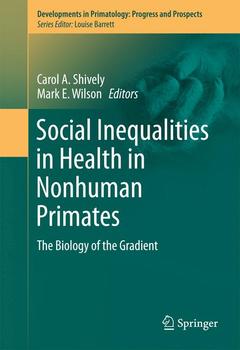Social Inequalities in Health in Nonhuman Primates, Softcover reprint of the original 1st ed. 2016 The Biology of the Gradient Developments in Primatology: Progress and Prospects Series
Coordonnateurs : Shively Carol A., Wilson Mark E.

Analyzes the deleterious effects of social stress, which increases morbidity and mortality from all of the illnesses that most commonly plague humans
Focuses on nonhuman primate models, providing easy translation to human health concerns
Focuses on social inequalities in health in a species other than our own, emphasizing the biology of social class common to all, not just some races, ethnicities, or levels of education
Includes supplementary material: sn.pub/extras
Date de parution : 04-2016
Ouvrage de 178 p.
15.5x23.5 cm



